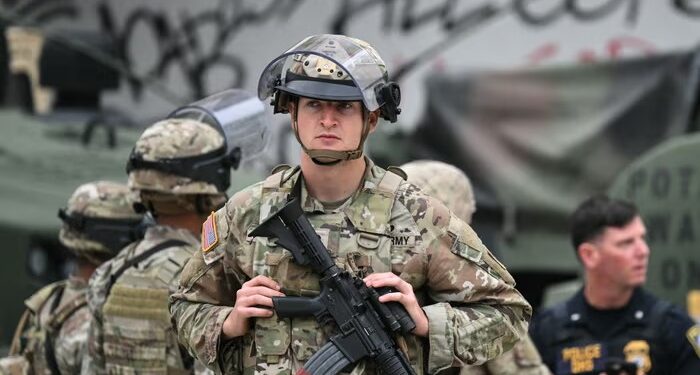The deployment of National Guard units and a contingent of U.S. Marines to Los Angeles has ignited a fierce political debate across the country, as former President Donald Trump returns to the centre of national controversy. Tensions escalated over the weekend following large-scale protests, sporadic violence, and the decision by California officials to request federal assistance in restoring order.
What began as a series of local demonstrations over police conduct and economic inequality quickly turned volatile on Friday night, with looting, vehicle fires, and clashes between demonstrators and police officers across parts of downtown LA and South Central. Though many of the protests remained peaceful, pockets of disorder prompted Governor Eleni Kounalakis to authorise National Guard support by Sunday morning. Hours later, Trump announced via social media that U.S. Marines would also be placed on standby to assist in “restoring law and order.”
The announcement has sparked an immediate backlash from political leaders, civil rights advocates, and even members of the military establishment. Critics say Trump’s intervention—though technically coordinated with state authorities—is driven more by political optics than by a measured response to the unrest. California Attorney General Rob Bonta called the move “provocative and unnecessary,” warning it could further inflame tensions in already distressed communities.
Trump, who remains a dominant figure in Republican politics and is currently campaigning for re-election, has used the moment to frame himself as a “law and order” candidate. Speaking at a rally in Phoenix, he praised the National Guard for “taking back our cities from chaos” and blamed Democratic leadership in California for the deterioration of public safety.
The White House has remained publicly neutral, with President Biden declining to directly criticise the move but stating that “peaceful protest must be protected, and excessive force must be avoided.” Behind the scenes, however, administration officials are reportedly concerned about the politicisation of military forces and the potential for federal overreach.
The inclusion of U.S. Marines—albeit in a standby, support-only capacity—has raised constitutional questions and unease among defence experts. Under the Posse Comitatus Act, active-duty military personnel are restricted from performing domestic law enforcement unless specifically authorised by Congress or in extraordinary circumstances. Pentagon spokespersons were quick to clarify that no Marines had been deployed on the streets of Los Angeles, and that their involvement, if required, would be limited to logistics and infrastructure support.
Public response has been polarised. Many residents of Los Angeles expressed fear that a military presence could escalate confrontations rather than ease them. Civil liberties groups have condemned what they see as a dangerous normalisation of military intervention in civilian affairs. Meanwhile, Trump supporters have hailed the move as a necessary step to “take back control” from what they describe as radical protest movements.
As of Tuesday morning, the situation on the ground appeared more stable, with a heavier police and National Guard presence visible throughout the city. Curfews remain in place in several districts, and over 300 people have been arrested since Friday. While there are no reports of Marine involvement in active operations, the optics of their mobilisation have already deepened the political divide.
Whether this moment becomes a flashpoint in the 2025 presidential campaign remains to be seen. But for now, Los Angeles stands as a stark symbol of a country still struggling to balance security, protest, and politics in a time of high tension.
newshub finance



Recent Comments